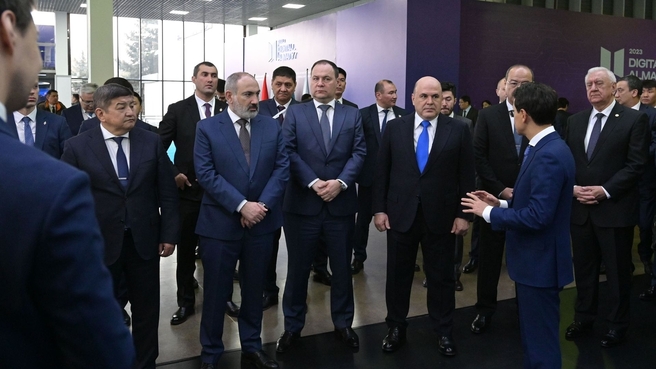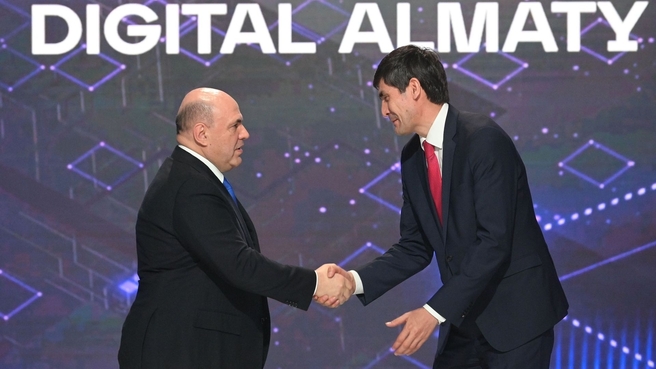The Prime Minister spoke at a plenary session of the Fifth Digital Almaty International Forum: Digital Partnership in a New Reality and took part in the Digital Almaty Award ceremony.
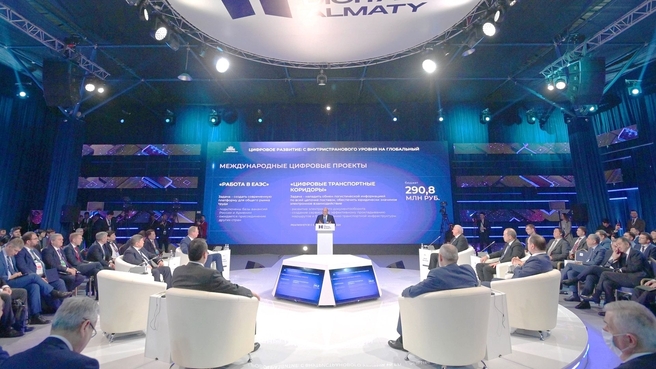
Mikhail Mishustin speaking at a plenary session of the Fifth Digital Almaty International Forum: Digital Partnership in a New Reality
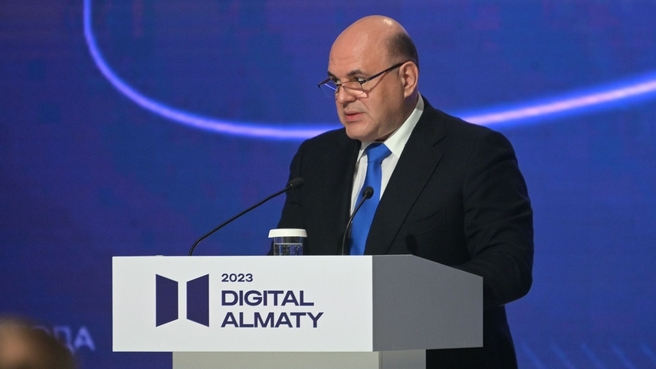
Mikhail Mishustin speaking at a plenary session of the Fifth Digital Almaty International Forum: Digital Partnership in a New Reality
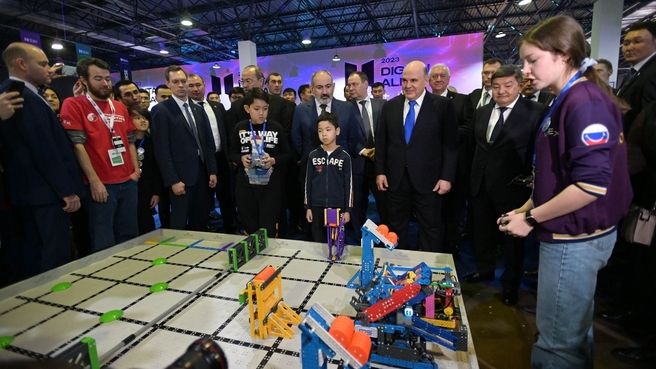
Mikhail Mishustin touring the digital projects exhibition together with heads of delegations attending the forum
Mikhail Mishustin speaking at a plenary session of the Fifth Digital Almaty International Forum: Digital Partnership in a New Reality
Before the plenary session, Mikhail Mishustin, together with heads of delegations attending the forum, toured the digital projects exhibition.
The annual Digital Almaty International Forum is the most ambitious innovative technological event in the CIS, involving representatives of business communities, international experts, the IT community, state agencies and the media.
The forum’s aim is to facilitate dialogue at the global and regional levels and to exchange experience in the sphere of digital transformation.
Excerpts from the transcript:
Mikhail Mishustin: Colleagues, friends,
First of all, I would like to thank hospitable Kazakhstan as well as Kassym-Jomart Tokayev and Alikhan Smailov personally for the brilliant organisation of the now traditional forum Digital Almaty.
We have all already toured the exhibits, seen bright-eyed young people, and looked at technological solutions in diverse areas, from public administration to games. And it is great! Already 30,000+ people have taken part in this forum.
Every year, this forum kicks off meetings with heads of government of EAEU member and observer states, and provides an opportunity to frankly discuss integration processes in the digital sphere among other things.
On 1 January, Russia assumed the chairmanship of the Eurasian Economic Union’s governing bodies. In his message to his EAEU colleagues, President of the Russian Federation Vladimir Putin stressed that one of the most important strategic priorities for joint work should be developing the technological potential of the union members and achieving true independence and self-sufficiency in this area. Together we need to join forces to create and implement advanced scientific and technical solutions in the leading sectors of our economies.
Digital technologies are global. And electronic services and financial flows know no state borders. Almost all the speakers talked about this.
Transnational corporations are absolutely free to collect information about people and companies. Data are the oil, gold and platinum of the 21st century for them. They create expanded user profiles based on data. That said, the Eurasian Economic Commission is still debating whether entering the VIN number of a commercial vehicle into a common union database can pose a threat to the national sovereignty of the five member states. This is nonsense.
For many years, we have been trying to reach an agreement on the recognition of digital signature (our colleagues said so today) or the launch of a common register of legal entities.
The active development of e-commerce in our countries has caused discrepancies in tax regulation: we have been dealing with this for two years. Of course, all this seriously hinders the strengthening of economic ties within the EAEU.
Moreover, open registries and basic solutions in all countries make it possible to find this information. It just needs to be properly integrated and appropriate digital services should be built on its basis.
Even the useful mobile app Travelling Covid-19 Free, which Mr Pashinyan spoke about at length today, did not immediately gain support. Its rollout was accompanied by a great deal of discussion with individual partners and colleagues. I believe, though, that it is simply obvious what it was created for and what the principles of its operation are.
We launched it in test mode, first for two countries. Then we launched it in three countries. Eventually, all of the five EAEU member states joined in, as well as Moldova, Tajikistan, Azerbaijan and Uzbekistan. By the end of last year, the number of users had already exceeded one and a half million, and 5 million PCR tests had been downloaded. Of course, we should use it at absolutely every opportunity and should further develop it to address the most important issue – the movement of the workforce. This is the idea of our union.
I would also like to note that last October in Manila, the developer of this service, the Eurasian Development Bank’s Fund for Digital Initiatives, received an award from the Association of Development Institutions in Asia and the Pacific. Such a product not only enabled normal air service to resume, but, more importantly, reduced the risks of spreading infection. This is a great example of what we can achieve when we implement digital solutions together and quickly.
The introduction of the mobile application Travelling Covid-19 Free has not infringed on the sovereignty of any of the EAEU countries, which was already evident when the idea was conceived. Although some colleagues did initially voice such concerns. Moreover, in creating the app, a unique architecture was developed that makes it possible to avoid providing personal data during the cross-border exchange of information, which is very important.
The certified medical laboratories of our states, where PCR testing is available, followed the same requirements and protocols. And they used one digital system, which provided the service for submitting test results.
A common platform solution with integrated national segments creates a barrier-free environment for the free movement of goods, services, capital and labour. And, of course, we should not stop there. I absolutely support what Mr Pashinyan said: think about how to use this application further.
The new mobile application Work in the EAEU is also based on this principle. The Russian database, with information on several hundred thousand vacancies, is also connected to it. Just the other day, as Mr Pashinyan said, Armenia joined the service. We expect that other partners will also take part in it.
The application is designed to become a modern platform for the common labour market. Today it is in demand, especially given increased migration processes between our countries. Friends, we should start simple and then move on to the complex. As we talk about artificial intelligence, new technologies and complex data, we must harmonise our basic systems. I think this is very important.
As for the free movement of goods, it should be facilitated by an ecosystem of digital transport corridors. Mr Golovchenko and my other colleagues were just talking about this.
The main goal is to help our business partners share logistics information throughout the supply chain, ensure legally significant electronic interaction with authorised bodies both within our countries and at the EAEU level, and establish effective routing and booking of roadside transport infrastructure.
I absolutely agree that electronic document management should replace all paper transactions. This will help form a full-scale technological infrastructure and create the basis for a showcase of national services.
In order to ensure the free flow of capital between our countries, it is also necessary to develop the interaction between the five countries’ payment systems, which is absolutely in the interests of our people and businesses, primarily small and medium-sized businesses.
The availability and friendliness of such services will help people feel the benefits of the integration in our union.
There should be more projects like this, carried out at a pace that meets the requirements of people today. It is already considered common that high-tech solutions are used in absolutely all areas of life. Today we saw how many applications are showcased at the Almaty Digital Forum. Look, even for a mortgage application, where you need to submit your data and make a face scan. A colleague said almost 80 percent of applicants are comfortable using this new technology. This seems to be a very good example.
Russia has a vision for how the world we know will be transformed by technology. We understand how such processes develop, so in the EAEU, we often act as the initiators of digitalisation; we support promising ideas to improve the business environment.
This will be helpful for all of us.
In Russia, we are doing a lot to ensure that public services can be provided online. Moreover, at a level that meets the expectations of our discerning users who are already accustomed to high quality services.
Russia ranks first in Europe in terms of the number of people with internet access. At the end of last year, we ranked sixth in the world in terms of the availability of broadband and mobile internet access, and tenth in the number of modern data centres.
Over 100 million people have personal accounts on the public services website. And over the past five years, there have been almost 50 percent more validated accounts. The number of services rendered increased by approximately 3.5 times per month on average. Covid also helped in this respect: it encouraged this digitalisation process and the active use of all possible services by the people. And by the way, it became very convenient. Many of these services, despite the fact that Covid no longer threatens our countries as much, made it possible to use new technological solutions every day. And our daily audience has almost quadrupled.
Our efforts are recognised by international experts. Despite the biased attitude of the West, the World Bank’s rankings (my colleagues mentioned this today) included Russia in the top ten countries with the highest level of use of information technology in the public sector. Approximately 200 countries were evaluated in the study. Indicators that reflect the degree of introduction of digital technology in public services, taxes, budgetary sectors, education and healthcare were considered.
Colleagues,
As part of Russia’s chairmanship of the EAEU, we call on the five member states to work towards achieving technological sovereignty. This is a matter of security of critical infrastructure, the dynamic development of various economic sectors and, as a result, the improvement of the quality of life of our people. This is especially important for young people who are used to fast, high-quality, up-to-date services through mobile applications.
The past year has clearly demonstrated that we cannot rely on Western companies as suppliers of hardware, software and technology. In today’s world, a lack of solutions means colonial dependence on those countries that have them and promote them on a global scale.
Indeed, existing products are user-friendly. Over the years, we have become accustomed to them. But access to them can be blocked in a minute, which, in the absence of our own solutions and alternatives, can result in a chronic lag behind the rest of the world.
Can we afford this? Of course not. All governments of union member states need to direct their efforts towards achieving technological sovereignty. But we have to be realistic.
First, none of our countries has a sufficient consumer market to support the creation and development of advanced technologies. But in cooperation we can achieve this.
Second, no country or association can claim complete technological independence, but the lack of our own products and production facilities in key economic sectors makes us unacceptably vulnerable. Therefore, we have to determine a mutually acceptable balance of self-sufficiency, to which we should all strive. Balance.
Russia is open to this cooperation with its partners, primarily in the EAEU and with other friendly states. We have something to offer. There are Russian analogues for most foreign software; already about 85 percent worth. We have begun to adjust them for the specific needs of businesses and production. We support the creation of new software products.
In order to do this, we have built a very serious system of competence centres. Over 500 leading Russian companies were involved in this. Developers, managers, representatives of business circles and authorities are united by a common goal: to ensure that all enterprises have popular and user-friendly software that is in no way inferior to foreign software.
Nearly 200 initiatives have been selected. Some are ready for rollout and mass production. At least 30 will be implemented this year and next year.
Most of the project funding is taken over by businesses. Private investments exceed 155 billion roubles today.
The centres’ task is not just to create a replacement for foreign products, but a competitive product that in the future will be able to enter the international market.
So, when selecting projects, the possibility of replication, export potential and the capability to be implemented in other countries were taken into account.
I know that our partners in the Eurasian Economic Union will at least be interested in this.
I also propose jointly developing the ecosystem of IT parks throughout the EAEU. We saw young people from the IT parks in our countries today. We talked to our colleagues from Uzbekistan. Stands from all countries were presented, and people there told us how they work and communicate. And that was great. This is an ecosystem for developers and programmers who are united by the common goal of developing technology in their countries.
Such a system of IT parks will provide an opportunity to promote technological innovations and to launch startups. Today we saw young people who began with startups and have already brought their products that are in demand by people and industries to the market.
The digitalisation of the public/private partnership via a platform, which was also shown today at the exhibition, is yet another prospective area for cooperation.
Russia is now working to create the GosTech comprehensive national platform that will unite popular services. About 750 federal and over 3,500 regional systems will be available on one platform. This is a domestic innovation. It is based on the use of universal ready-made modules that can be customised for specific needs and reused. It is in the final stages of putting into operation.
GosTech helps to resolve the most important task – promoting technological independence in the state IT sector and eliminate any possible cyber threat. In a year or two, the platform may also serve to integrate the digital interaction of the EAEU member states and people.
Competent specialists are needed to implement joint digital initiatives. It is important that the Eurasian space pursues a personnel policy that can contribute to the training of such professionals.
Russia has practically doubled the benchmarks for admission to state-funded places in universities in the field of information technology. We have launched the Digital Chairs project at universities for students in all areas. There are also programmes for further training in IT professions on online educational platforms.
We are open to highly qualified foreign specialists in such an important industry and we are creating the necessary conditions for them. A law has been adopted under which the procedure for obtaining a residence permit will be fast-tracked for them, as well as for their family members
Colleagues, friends,
Digital transformation opens up great opportunities for further integration in the Eurasian space. Advanced technologies expand the amount of information on the availability and quality of goods and products, ensure timely delivery, and help establish cooperation between manufacturers and suppliers, bypassing regulators and intermediaries. They improve the business environment so that businesses, large and small, can integrate into the regional and global economies.
We consider the joint international exhibition “Eurasia is Our Home,” to demonstrate the achievements of the five states and partners, to be a very important step. As a reminder, it will take place in early June in Sochi, at the same time as the meetings of the Eurasian Intergovernmental Council and the Council of CIS Heads of Government, as well as the Eurasian Congress. I invite everyone to take part in these events.
Friends,
We have all the tools at our disposal to resolve the problems we face. The main thing is to coordinate our efforts, set goals and act together.
Once again, I would like to wish all the participants of today’s forum interesting and productive discussions and good luck.
